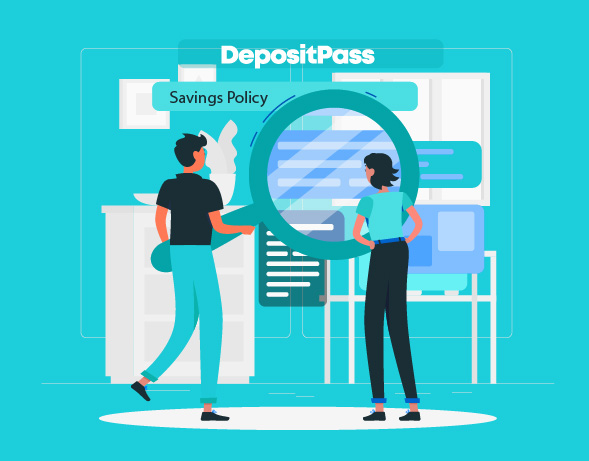Easy Rental Deposit for
Renters
DepositPass is the superior way to rent so you can spend your money on the things you love. We help Renters solve renting financial problems by focusing on the dreaded cash rental deposit and providing an easy rental deposit alternative. With DepositPass, Renters can assign their life savings insurance policy, or even that of a family member or friend, to a rental deposit, guaranteeing property coverage for landlords.

Say Goodbye to Hassles: Get an Easy Rental Deposit with DepositPass
Save money
Up to 35% or more in fees saved with our unique one-off and all-in fee. No recurring fees or other charges.
Save time
Streamlined rental deposit process with minimum documentation and 100% digital convenience.
No credit check
No need for credit checks as DepositPass works with your life savings insurance policy or that of a family member/friend.
Secure
Your information and payment are secure with us. We work with the best service providers in the industry.
Just sign up & follow the next steps
1. Create your account
2. Enter property and rent details
3. Enter insurance policy details
4. Pay your fee
5.Obtain your insured rental deposit
Choose Your Path to Rental Deposit Solutions
At DepositPass, we offer a range of channels to assist you. Whether you have questions, need support, or want to explore our rental deposit solutions, we’ve got you covered. Select the option that suits you best:

Free Consultation
Schedule a consultation to discuss how we can simplify rental deposits for you.

Chat Now
Have questions? Start a chat with our experts for instant assistance.

Policy Review
Our team is happy to review your life insurance policy to see if it’s eligible for our service.
Frequently Asked Questions
General
Also called security deposit, it is the money that is paid to a landlord by a renter to help protect the landlord against possible financial loss. The renter’s deposit is held by the landlord during the term of the tenancy and refunded at the termination of the tenancy agreement.
In England no more than five weeks’ rent (refundable) is payable where the annual rent is less than £50,000, or six weeks’ rent where the annual rent exceeds £50,000.
There is no limit on the amount of deposit a landlord/agent can ask for in Northern Ireland.
In Scotland a deposit cannot exceed 2 months’ rent. Charging any more than 2 months’ rent for a deposit constitutes an illegal premium.
Usually, it is the equivalent of 1 month’s rent in Wales.
Start of tenancy
There are a few documents that your agent should provide you with at the beginning of your tenancy and these should include:
- How to rent guide
- Energy Performance Certificate
- Gas Safety Certificate
- Electrical Safety Certificate
- Instruction manuals for appliances such as the boiler
- Signed Tenancy Agreement
- Inventory or check-in report
We would encourage you to take time to read your check-in report/inventory and go around the property checking that the description of the items, condition of the decor and standard of cleaning is consistent with that which is stated. Usually, it will be a true representation of the property, but this is your opportunity to query any missing items or inconsistencies as you see them. If you find that, for example, the check-in report states that the oven is cleaned to a professional standard but that the grills are greasy, make a note on the inventory and report this to the landlord immediately. Often the landlord will ask you to return the inventory within 7 days and report any cleaning issues within 48 hours and it is important that you stick to any timescales given. While taking photographs is a good idea, it is difficult to establish cleanliness from a photograph, so while they can be great supporting evidence in some cases (for example the inside of an oven), the written description is key. It is impossible to photograph a smell, or something that is sticky, and taking a photograph of dust on a carpet can be equally tricky, so clear, concise wording describing the item is most useful. It can also be a good idea to pay special attention to areas which tend to have the most use or require the most cleaning, such as:
- The oven
- The shower/bath
- The fridge/freezer (this should also be defrosted)
- The windows
- The flooring
If you did not move into the property and the tenancy did not commence, please contact our team at info@depositpass.com
During tenancy
You will be in ‘rent arrears’ if you fall behind with your rent payments to your private landlord or agent.
Although dealing with rent arrears can be tough, you should take action as quickly as possible. If you ignore your arrears, the problem will only get worse.
See if you can agree to a repayment plan to pay off your rent arrears.
A repayment plan means you’ll make smaller payments to your landlord over a longer period of time. You will still have to pay everything back – but it could be easier than paying the full amount in one go.
Your landlord is generally responsible for keeping in repair:
- The structures and exterior of your home, for example, the walls, roof, foundations, drains, guttering and external pipes, windows and external doors
- Basins, sinks, baths, toilets and their pipework
- Water and gas pipes, electrical wiring, water tanks, boilers, radiators, gas fires, fitted electric fires or fitted heaters.
Your landlord can only make repairs when he/she knows there is a problem – so make sure you tell him/she about any repairs that are needed.
Tenants have a duty of care to promptly alert landlords to any areas of concern that may need repairing or replacing, such as when mould starts to appear. But who is responsible for mould during the tenancy? Typically, the response we usually see is that landlords are responsible when there is a fault with the building that caused the mould, for example, a leaky pipe. Tenants are responsible for housekeeping and if the mould develops during their tenancy i.e., was not present at the beginning of the tenancy and was not as the result of a fault with the property, it may be down to lifestyle. However, this is not always the case, and every case should be considered based on the evidence provided. You should seek legal advice if you wish to know the likelihood of a result in your individual case.
You don’t have to pay a penny more than our standard membership fee. As always, you’re expected to treat your rented accommodation with care and to cover the cost of any damages at the end of your tenancy. Please also remember that pets should only ever be kept in accommodation where they are expressly allowed.
If you have any issues during your tenancy, you should contact your landlord or managing agent as soon as possible to report them.
End of tenancy
Once you have vacated the property at the end of your tenancy, your landlord releases you or the 3rd party who provided the life insurance savings plan (policy) from the deed of assignment signed at the start of the tenancy.
Yes. In this case we offer you a discount of up to 20% on the payable fee.
There are no early termination charges to DepositPass if your tenancy ends earlier than expected. However, if you need to leave before the end of your tenancy, your landlord or agent could charge an ‘early termination’ fee to cover any reasonable costs. For example, rent up to the end of your fixed tenancy period or costs to find a new tenant. It is important that you speak to your agent or landlord to discuss this with them directly.
Once your tenancy has ended you should request a copy of the check-out report/inventory ASAP. If the check-out report is inaccurate, you should note these issues and submit them to your landlord or agent in writing so they can be added to the report.
If you and your landlord go into a dispute over damages or cleaning, the inventory will be the most significant piece of evidence. Knowing the standard of the property at the start of your tenancy helps to set clear expectations of the maintenance required of you. Inventories also help safeguard tenants against unfair charges when moving out of a property.
At the end of your tenancy your landlord or agent can charge you if you have broken the terms of your tenancy agreement. Common reasons for deduction include:
- Cleaning
- Damage
- Redecoration
- Unpaid rent
- Gardening
The landlord can only claim to restore any issues in the property to the position they would have been in had you met the terms of your tenancy agreement. The normal decline in the condition of the property and its contents (known as wear and tear) cannot be charged to the tenant and must be factored into the amount charged for repairs, redecoration or replacements.

